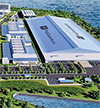Frontline: Fourth Industrial Revolution Takes Off, “Localizing” Site Selection Requirements
The adoption of new technology — in what’s been called “the fourth industrial revolution” — will benefit the entire manufacturing ecosystem.
Q1 2017

With consumer demand for the “latest and greatest” continuing to drive that convergence, Raymond says the biggest challenge for the manufacturing industry will be helping eliminate the “mismatch” between the skills required by the new manufacturing and the supply of workers who have those skills. But a NAM survey of manufacturers showed a high level of optimism about the impact of technology going forward, Raymond says, the belief that “the adoption of new technology will only increase and benefit the entire manufacturing ecosystem.”
As 2017 begins, Michelle Drew Rodriguez, manufacturing leader for Deloitte’s Center for Industry Insights, sees “limitless possibilities” for manufacturing: “Each of those trends is definitely poised for growth with the IoT, smart products, and smart factories. When you look at them combined, that’s really where the true value comes together.” As an example, she cites autonomous cars, which bring together artificial intelligence, the IoT, digital sensors, and other technologies.
U.S. Poised for Resurgence
In Deloitte’s 2016 global manufacturing competitiveness survey of more than 500 executives, the U.S. came out on top as the country which is expected to be most competitive by the end of the decade. “The U.S. has been poised for a resurgence, within the past couple of years,” Rodriguez says. “We’re seeing that in the news, with both domestic and international companies investing more in the U.S., especially around manufacturing. Modern manufacturing is moving to increasingly advanced technologies and skill sets.” [When it comes to site selection, companies ] are looking at more localized requirements. Consumers are asking for greater customization, and asking for things to be relatively immediate, which is driving the localization of advancements in the industry. Greg Matter, Managing Director and leader of Advanced Manufacturing Group, JLL
Rodriguez says Deloitte’s research indicates that talent has become the number-one driver of manufacturing competitiveness, “so we’re seeing companies making site selection choices based on where the skilled workforce is, both from a talent and from a broader supply chain perspective.” Proximity matters, as does having “a more tightly integrated supply chain or network — because consumers expect quicker, more convenient, more cost-effective, and more customized [products].”
Greg Matter, a managing director with JLL and leader of its advanced manufacturing group, says he agrees that when it comes to site selection, companies “are looking at more localized requirements. Consumers are asking for greater customization, and asking for things to be relatively immediate, which is driving the localization of advancements in the industry.”
With the Trump administration’s emphasis on creating jobs, some companies that had been looking at investments in Mexico are reconsidering the U.S., Matter says. He notes that the three largest third-party manufacturing firms “are all growing their operations in the U.S., and not only in the lower-cost U.S. markets. They’re expanding in places like Silicon Valley.”
For example, in January, Taiwan-based Foxconn Technology Group announced it is considering building a $7 billion, display-panel manufacturing facility in the U.S. in a joint venture with Apple that could create up to 50,000 jobs. And, within the past year, Flex Ltd., the Singapore-based electronics manufacturer, announced new partnerships with MAS Holdings, a “technology apparel” maker, to “integrate the IoT into clothing”; Aito, whose haptic interface technology can eliminate the need for physical buttons in vehicles; and Enable Injections, which makes wearable medical devices that enable easy, self-administration of injectable drugs. It’s all part of what is being called “the fourth industrial revolution.”
Project Announcements
Shapeways Holdings Expands Livonia, Michigan, Operations Complex
07/07/2023
Germany-Based Becker Robotic Equipment Plans Canton, Georgia, Manufacturing Complex
12/07/2022
LEGO Group Plans Chesterfield County, Virginia, Manufacturing Plant
06/17/2022
Scotland-Based PowerPhotonic Plans Sahuarita, Arizona, U.S. Headquarters-Production Campus
04/04/2022
A. Duie Pyle Plans Manassas-Richmond-Roanoke, Virginia, Cross Dock Service Centers
03/15/2022
Black Buffalo 3D Corporation Relocates-Plans Smithfield Township, Pennsylvania, Manufacturing Complex
02/07/2022
Most Read
-
The Workforce Bottleneck in America’s Manufacturing Revival
Q4 2025
-
Rethinking Local Governments Through Consolidation and Choice
Q3 2025
-
Lead with Facts, Land the Deal
Q3 2025
-
Tariff Shockwaves Hit the Industrial Sector
Q4 2025
-
Investors Seek Shelter in Food-Focused Real Estate
Q3 2025
-
America’s Aerospace Reboot
Q3 2025
-
The Permit Puzzle and the Path to Groundbreaking
Q3 2025


